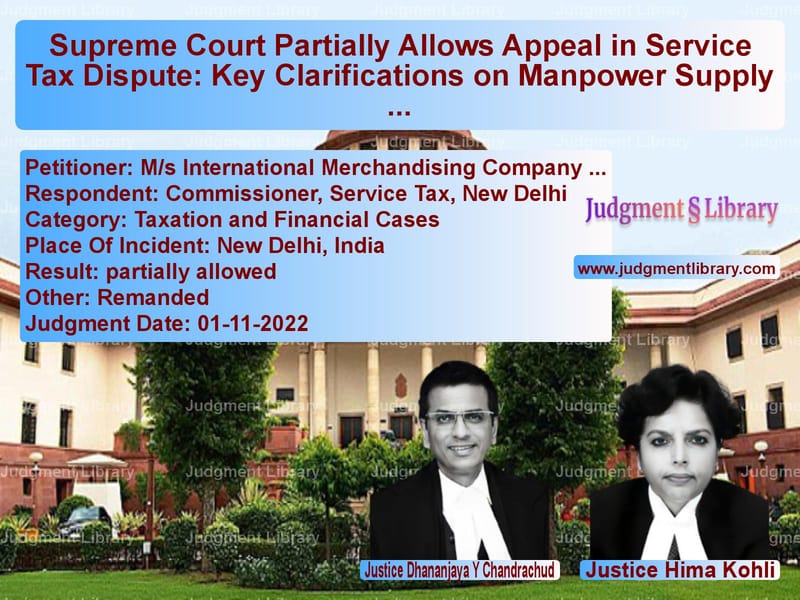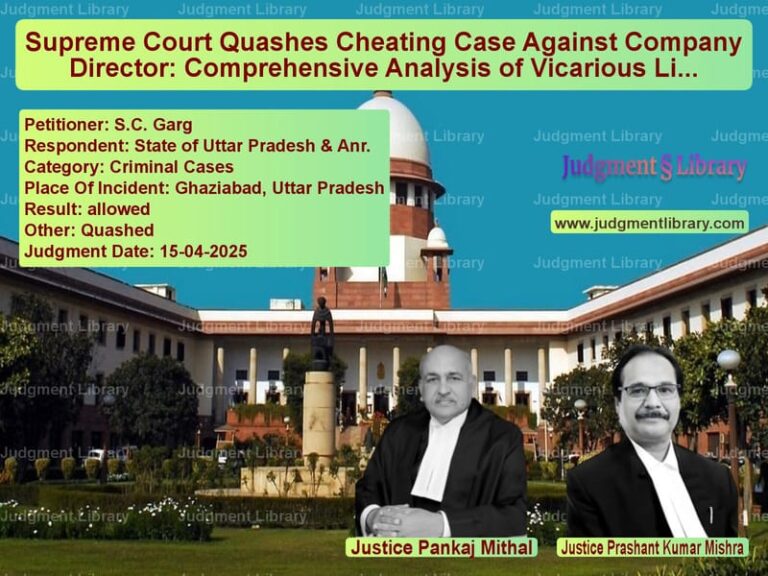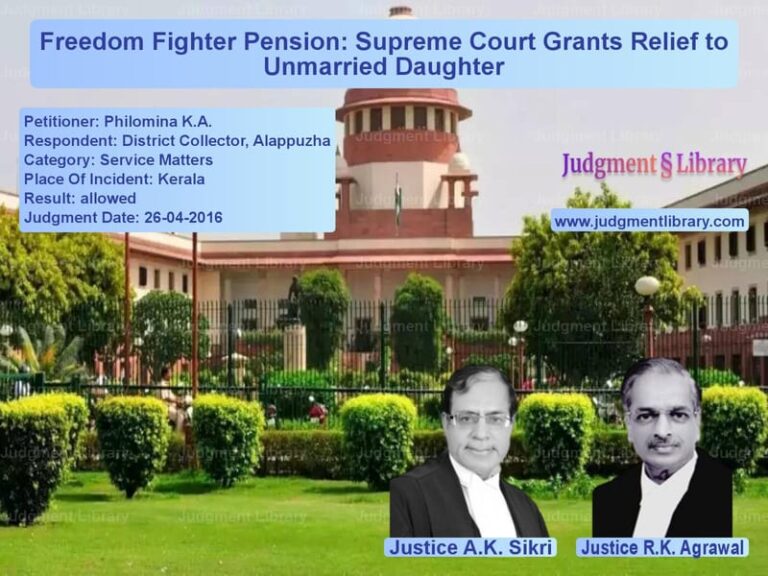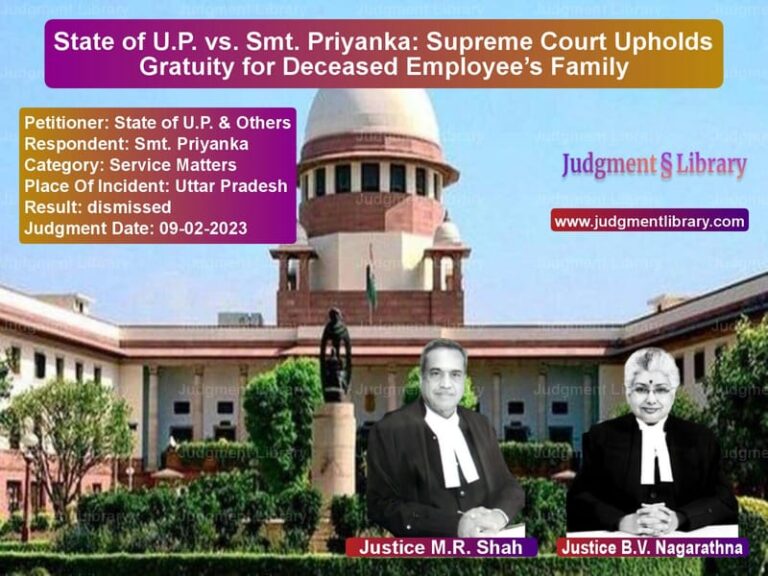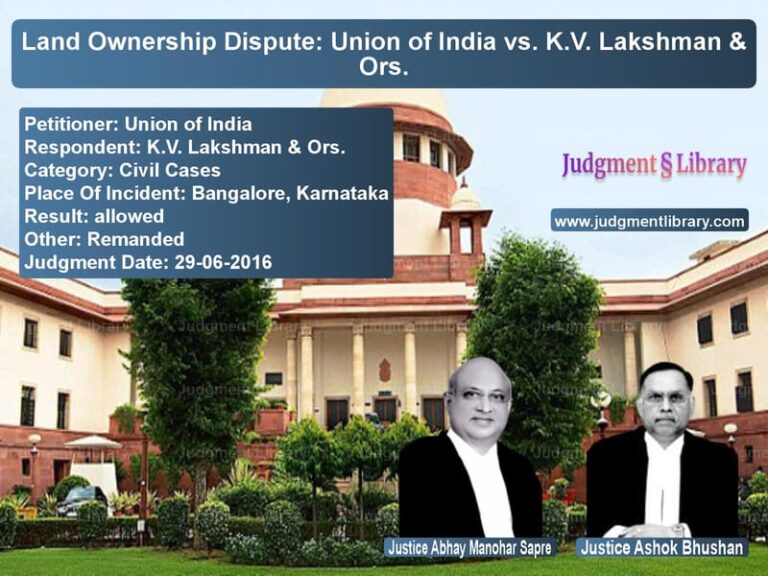Supreme Court Partially Allows Appeal in Service Tax Dispute: Key Clarifications on Manpower Supply and Program Production Services
The Supreme Court of India recently ruled in the case of M/s International Merchandising Company LLC vs. Commissioner, Service Tax, New Delhi, addressing the applicability of service tax under the Finance Act, 1994. The Court analyzed whether the company was liable to pay service tax for engaging sports celebrities and licensing television rights for sporting events.
This judgment provides significant clarifications on the definition of ‘manpower supply services’ and ‘programme producer services’ under the Service Tax regime.
Background of the Case
The appellant, M/s International Merchandising Company LLC, is a sports management company involved in organizing events like the Chennai Open Tennis Tournament. It entered into multiple agreements, including:
- Hiring sports personalities like Vijay Amritraj and Paradorn Srichaphan for appearances at events.
- Licensing broadcasting rights of sporting events to Zee Telefilms and Trans World International.
- Sharing IT services with group companies and engaging in secondment arrangements.
The Service Tax Department issued five show cause notices covering the period April 2004 to March 2012, demanding tax under various heads, including manpower supply services, programme producer services, and sponsorship services.
Arguments by the Parties
Appellant (M/s International Merchandising Company LLC)
- Contended that engaging celebrities for appearances does not constitute ‘manpower supply services.’
- Argued that licensing broadcasting rights does not amount to providing ‘programme producer services.’
- Claimed that the agreements were purely commercial and should not be considered taxable services.
- Challenged the invocation of the extended period of limitation, stating that the dispute arose due to interpretational differences in law.
Respondent (Commissioner, Service Tax, New Delhi)
- Maintained that hiring sports celebrities through intermediaries qualifies as ‘manpower supply services’ under Section 65(68) of the Finance Act.
- Asserted that selling broadcasting rights to TV channels falls under ‘programme producer services.’
- Argued that the extended period of limitation was applicable due to the appellant’s failure to disclose relevant details.
Observations by the Supreme Court
The Supreme Court analyzed the agreements and made key observations:
- The definition of ‘manpower supply services’ covers situations where a company engages in supplying individuals for specified services.
- The appellant’s agreement with sports celebrities did not establish an employer-employee relationship, thereby falling outside the ambit of manpower supply services.
- Licensing broadcasting rights involves granting telecast permissions, which does not constitute programme production.
- The extended period of limitation under service tax laws was not applicable since the case primarily involved interpretation of legal provisions.
The Court quoted:
“For an activity to qualify as manpower supply services, there must be an underlying employer-employee relationship or direct supply of manpower to perform tasks under another entity’s supervision.”
Final Verdict
The Supreme Court partially allowed the appeal and ruled as follows:
- The service tax demand on ‘manpower supply services’ was quashed as the engagement of sports personalities did not fall within the definition.
- The demand related to ‘programme producer services’ was also set aside, as licensing telecast rights did not involve content production.
- The extended period of limitation was not applicable, and any reassessment must be confined to the normal period.
- The matter was remanded for recalculating penalties based on valid tax liabilities.
Impact of the Ruling
This judgment has critical implications for service tax assessments. Key takeaways include:
- Clarification on Manpower Services: Businesses engaging celebrities for endorsements or appearances may not be liable under manpower supply services.
- Broadcasting Rights and Service Tax: Selling telecast rights does not equate to producing content and is not taxable under programme producer services.
- Limitations on Extended Period: Authorities cannot invoke an extended limitation period in cases involving legal interpretation.
Conclusion
The Supreme Court’s decision in this case sets a precedent for how service tax laws should be interpreted in relation to sports management, celebrity endorsements, and media rights. The ruling provides relief to event management companies and broadcasters by exempting certain activities from service tax liability.
This case will likely influence future tax disputes concerning manpower supply and content licensing in the sports and entertainment industry.
Petitioner Name: M/s International Merchandising Company LLC.Respondent Name: Commissioner, Service Tax, New Delhi.Judgment By: Justice Dhananjaya Y Chandrachud, Justice Hima Kohli.Place Of Incident: New Delhi, India.Judgment Date: 01-11-2022.
Don’t miss out on the full details! Download the complete judgment in PDF format below and gain valuable insights instantly!
Download Judgment: ms-international-me-vs-commissioner,-servic-supreme-court-of-india-judgment-dated-01-11-2022.pdf
Directly Download Judgment: Directly download this Judgment
See all petitions in Income Tax Disputes
See all petitions in Tax Evasion Cases
See all petitions in Banking Regulations
See all petitions in Tax Refund Disputes
See all petitions in GST Law
See all petitions in Judgment by Dhananjaya Y Chandrachud
See all petitions in Judgment by Hima Kohli
See all petitions in partially allowed
See all petitions in Remanded
See all petitions in supreme court of India judgments November 2022
See all petitions in 2022 judgments
See all posts in Taxation and Financial Cases Category
See all allowed petitions in Taxation and Financial Cases Category
See all Dismissed petitions in Taxation and Financial Cases Category
See all partially allowed petitions in Taxation and Financial Cases Category

